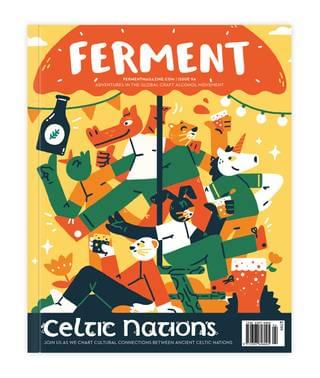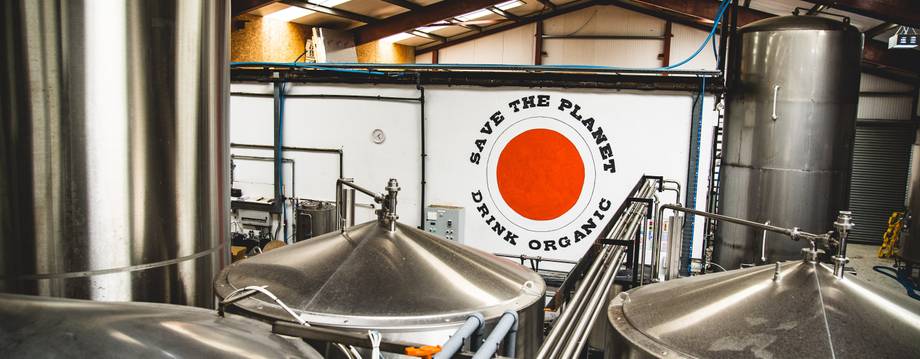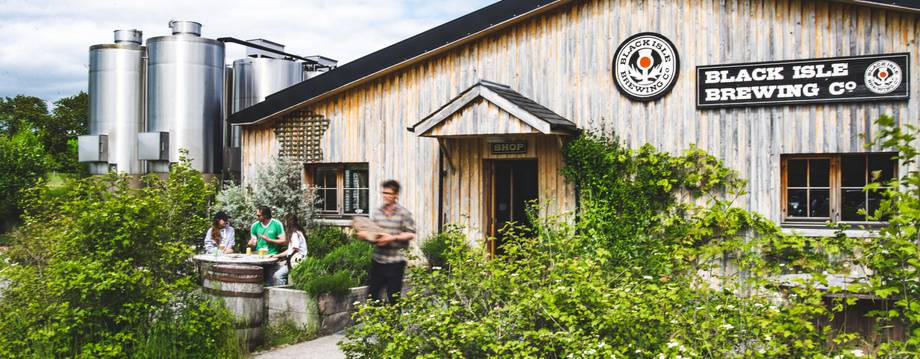Nature is as nature does
Invigorated by its recent attainment of B Corp status, Black Isle has plans to expand and strengthen connections with its locality and surrounding community
Robyn Gilmour
Photos:
Black Isle Brewery
Saturday 29 July 2023

This article is from
Celtic Nations
issue 94
Share this article
Founded for and by the Scottish Highlands, Black Isle Brewery is not only a cornerstone of the region's rich brewing heritage and commitment to sustainability, but an undying champion of the distinct flavours that locate the Highlands on a world map of culinary interest. Now celebrating its 25th anniversary – and 26th year of brewing – this organic brewery remains as staunch an advocate for natural brewing processes as when it first opened, and with the passing years, has only intensified its efforts to make nature a central tenet of the brewery’s relationship to its surrounding community.
When founder David Gladwin set up Black Isle, organic brewers were almost unheard of due to the limited availability and prohibitive costs of organic ingredients. That said, his foresight and dedication to a healthier, greener future paid off when society began to better recognise and appreciate more natural ways to grow and produce the things we eat and drink. With physical, social and environmental health in mind, Black Isle leaped at the chance to take on 130 acres of farmland in 2011, when it moved brewing operations just up the road from its original site to the modern facility it works from now.

In addition to enhancing the farmland’s biodiversity with over 7000 native broadleaf trees, reinstated hedgerows, new ponds and wetlands, the farm supplies both of the brewery’s craft beer bars with organic produce for pizza topping and salads. The brewery also boasts recipes and raw materials which are 100% organic, and sourced as locally as possible, as often as possible.
Lawrie Wotherspoon, Black Isle’s head of operations expands on this, saying “the farm supplies our Fort William and Inverness based bars as much as possible, but each year we try to marry them up more closely. Currently that’s going really well, with spent grains from the brewery becoming compost for the garden, or feed for our lambs and cattle. The veg, lamb and beef is then used by our chefs in the bars for delicious pizzas and salads. It's an evolving cycle which is central to what we do”.
The connection between the farm, brewery, and bars is not just symbolic but also reinforces the brewery's ethos of supporting local communities and reducing its carbon footprint. In addition to its organic practices, Black Isle Brewery attained B Corp status earlier this year, the rigorous accreditation process for which allowed the brewery to reflect on its policies and work towards improvements that will ensure it remains at the forefront of sustainable brewing practices.

But B Corp accreditation isn’t just about sustainability, joining the globally recognised ranks of businesses doing quantifiable and tangible good in the world requires taking a significant degree of social responsibility. Recognising the importance of community engagement, Black Isle has actively involved local schools in its journey. Through its innovative garden programs, the farm hosts school children three times a week to allow them the opportunity to see the food they plant and harvest, right through to the kitchen, when they create their own meals using fresh vegetables from the garden. This hands-on experience not only educates young, local children about food production but also fosters an appreciation for nature and sustainability among young people.
With its sights set on the future, Black Isle is on the cusp of seeking permission to begin work on a new brewery site on the outskirts of Inverness. Expansion of operation will not only alleviate the pressures on the farm – which Lawrie says currently has to accommodate traffic to the brewery, and infrastructure to manage the wastewater coming from it – but also holds the potential to support educational initiatives located near the new proposed site.
“We know we’re going to have to work at keeping our connection to the farm a visible part of our business, after all, people associate us with being rural and based in this very lovely spot, but I think we can achieve that where we're going . This new site has lots of room and can be made into a really beautiful space with fruit trees and wildflower meadows, all of which will allow us to maintain that connection to nature. Moving the brewery will also increase our capacity to do more of the educational stuff, and that’s everything from running courses, hosting volunteers at the farm, and getting school kids in.”

For all Black Isle is a brewery that’s proud to be defined by its locality and sublime natural surroundings, Lawrie says the brand wouldn’t hesitate to branch further into other parts of Scotland. I'm sure you've heard this 100 times” he says, “but during lockdown there was an increased focus on locality, and people started to look closer to home for their beer. I think this was the case all around the country, and it makes sense.
“If I were sitting in a pub in Leith, for example, I would want to drink beer from a Leith-based brewery. Having said that, if the opportunity presented itself, we would certainly love to take the Black Isle bar experience to other parts of Scotland. We sell a lot of beer in Aberdeen and the central belt, so if the right site came up in Dundee, Glasgow, Edinburgh, we’d absolutely go for it. We’re looking all the time, really.”
He continues, saying that there’s nothing to stop Black Isle Brewery, alongside other Scottish breweries, from generating the same buzz around Scottish beer as currently exists in the Scottish whisky industry. With its hard Highland water and focus on quality, Black Isle Brewery has already made an impact by making dark beers that have attracted customers from around the globe, including the discerning Japanese market.
By leveraging the reputation and allure of the Highlands, Black Isle Brewery embodies a desire to produce a wonderful range of beer in a manner which works with nature, rather than against it, whilst showcasing the ability of Scottish brewers to mix it with the world's very best.
Share this article

